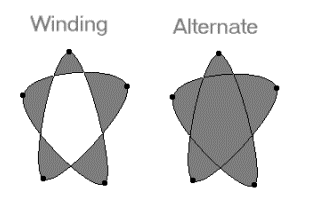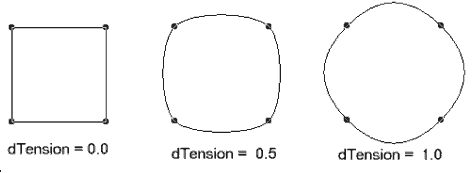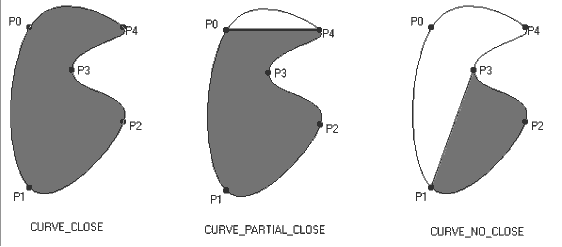CURVE
typedef struct tagCurve{L_UINT uStructSize;L_INT nType;L_INT nPointCount;L_POINT *pPoints;L_UINT uFillMode;L_DOUBLE dTension;L_INT nClose;L_INT nReserved;} CURVE, *pCURVE;
The CURVE structure defines a curve for the L_SetBitmapRgnCurve function and the L_CurveToBezier function.
| Member | Description | |
| uStructSize | Size of this structure in bytes, for versioning. Use the sizeof() macro to calculate this value. | |
| nType | Flag that indicates the type of curve defined. Possible values are: | |
| Value | Meaning | |
| CURVE_BEZIER | The points specified in the pPoints field define a Bezier curve. | |
| CURVE_STANDARD | The points specified in the pPoints field define a standard curve. | |
| CURVE_NATURAL_CUBIC_SPLINE | The points specified in the pPoints field define a natural cubic spline curve. | |
| nPointCount | Number of points in the pPoints array. | |
| If nType is CURVE_BEZIER, nPointCount must be 3n + 4, where n >= 0. For example, nPointCount can be 4, 7, 10, 13, and so on. | ||
| If nType is CURVE_STANDARD, nPointCount must be greater than or equal to 3. For example, nPointCount can be 3, 4, 5, 6, and so on. | ||
| If nType is CURVE_NATURAL_CUBIC_SPLINE, nPointCount must be greater than or equal to 3. For example, nPointCount can be 3, 4, 5, 6, and so on. | ||
| pPoints | Pointer to an array of L_POINT structures that contain the points that define the curve. | |
| uFillMode | Flag that indicates how to handle complex crossing lines. The following are valid values, which are illustrated below: | |
| Value | Meaning | |
| L_POLY_WINDING | [0] All pixels that are inside the resulting exterior lines are in the region. | |
| L_POLY_ALTERNATE | [1] The region includes the area between odd-numbered and even-numbered polygon sides on each scan line. | |

|
||
| dTension | Value that indicates the "straightness" of the curves that connect points. This value is used only when nType is CURVE_STANDARD. Valid values are between 0.0 and 1.0, where 0.0 indicates straight lines, and 1.0 indicates lines with the highest curvature. A typical value for dTension is 0.5. | |

|
||
| nClose | Value that indicates how the curve is closed. This value is used only when nType is CURVE_STANDARD. Possible values are: | |
| Value | Meaning | |
| CURVE_NO_CLOSE | [0x0] For n points, draw (n - 3) segments. For example, for points {P0, P1, P2, P3, P4}, draw segments P1P2 and P2P3. | |
| CURVE_CLOSE | [0x1] For n points draw (n) segments. For example, for points {P0, P1, P2, P3, P4}, draw segments P0P1, P1P2, P2P3, P3P4, P4P0. | |
| CURVE_PARTIAL_CLOSE | [0x2] For n points draw (n - 1) segments. For example, for points {P0, P1, P2, P3, P4}, draw segments P0P1, P1P2, P2P3, P3P4 (but not P4P0). | |
| In the following diagram, the resulting region is shown in gray. | ||

|
||
| nReserved | Reserved for future use. | |
Comments
The CURVE structure is used by the L_SetBitmapRgnCurve function to draw a curve using an array of POINT items. It is also used by the L_CurveToBezier function to convert a curve to a Bezier. The CURVE structure can define three types of curves:
-
nType is CURVE_STANDARD: A minimum of three points define a smooth curve that goes through all of the points. In this case, nPointCount must be equal to or greater than three.
-
nType is CURVE_BEZIER: A minimum of four points defines a series of one or more Bezier curves. In this case, nPointCount must be 4+3n, where n is equal to or greater than 0. For example, nPointCount can be 4, 7, 10, 13, and so on. The first four points define the first Bezier curve, and each subsequent group of three points defines the next Bezier curve, using the last point of the previous Bezier curve as the starting point.
-
nType is CURVE_NATURAL_CUBIC_SPLINE: A minimum of three points define a smooth curve that imitates the behavior of a plastic rod bent around control pegs (an engineering spline). This behavior can be used to imitate or suggest three-dimensional bending and rotation. In this case, nPointCount must be equal to or greater than three.
Some functions which take this structure as a parameter require that the structure be initialized prior to the function call. You must set the uStructSize member to the total size, in bytes, of the structure. Use the sizeof() macro to calculate this value. Functions that do not require the structure be initialized will take the total size of the structure, in bytes, as an additional function parameter.
© 1991-2017 Apryse Sofware Corp. All Rights Reserved.
